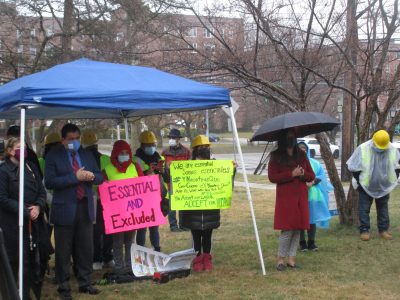Supporters of Excluded Workers Go on Hunger Strike to Back State Relief Bill

A group of immigrant workers and their advocates launched a two-week hunger strike last week to demand that New York State provide $3.5 billion of assistance to those who have been excluded from federal stimulus checks and unemployment.
About 100 supporters gathered in a cold rain outside the White Plains Presbyterian Church last Thursday morning calling on the state legislature to approve a pending bill that would allocate $3,300 a month in direct payments from April through December for workers and their families.
It would compensate those who have lost wages during the COVID-19 pandemic because of unemployment or reduced work and households that have lost income because the primary earner has become disabled or died.
Proposed in state Senate bill S4543 and Assembly bill A5421, money from the Excluded Workers Fund would go to households that have not received federal assistance or unemployment insurance. Most excluded workers are undocumented, but others are living and working legally in their communities and have fallen through the cracks.
Peekskill Councilwoman Vanessa Agudelo, Hudson Valley manager of member engagement at the New York Immigration Coalition and one of the roughly dozen people in Westchester participating in the strike called the Fast of the Forgotten, said all workers who have been negatively impacted by the pandemic deserve the same treatment, with many of the excluded workers having helped to keep the economy and food supply going.
Many in the immigrant communities across the state have experienced a disproportionate negative impact because a greater percentage of those workers have held jobs in service-oriented businesses.
“Our communities are forced to stand in line every day, sometimes for hours during a pandemic just to guarantee that they’ll have food to put on the table for them and their children that evening,” Agudelo said.
“We know that our immigrant communities are the backbone of this state. We know that our immigrant communities are the reason our economy is so successful and we know that we’ll need these workers if we look to recover from this pandemic,” she added.
Another striker, Noelle Damico, director of social justice for the Manhattan-based Workers Circle, was one of several participants who pointed out that a person cannot be deemed essential but excluded from benefits.
“Thousands of our workers across the state are ready to go the distance with you to make sure that you, who have made sure that we are healthy and are recovering and helped us construct this community and made sure that there’s food on our table, all of the work that you have done, and most importantly, who you are as our sisters and brothers, is respected by Albany,” Damico said.
The hunger strike will last until Apr. 1, the scheduled deadline for the state budget.
A few members of the Westchester contingent of the state legislature, including state senators Shelley Mayer (D-Yonkers) and Peter Harckham (D-Lewisboro), sent representatives to express support for the action.
“I am proud to support the state Senate’s Excluded Workers Fund in its budget, which will provide a record amount of disaster relief for residents who truly deserve this help,” said Tito Davila, from Harckham’s office. “This is money that will help landlords, small businesses and local communities get back on track. In the meantime, I will continue to fight to ensure that excluded workers and their families have the resources they need.”
However, last Monday, the Senate passed the One-House budget resolution that includes only $2.1 billion in the Excluded Workers Fund, a sum that those who gathered last week in White Plains argued is insufficient to help all those in need.
“Our workers deserve to have equal relief to that of every other worker in New York State,” Agudelo said. “Our workers and our families deserve to be able to rely on the benefits and the programs that every New Yorker has access to.”

Martin has more than 30 years experience covering local news in Westchester and Putnam counties, including a frequent focus on zoning and planning issues. He has been editor-in-chief of The Examiner since its inception in 2007. Read more from Martin’s editor-author bio here. Read Martin’s archived work here: https://www.theexaminernews.com/author/martin-wilbur2007/
